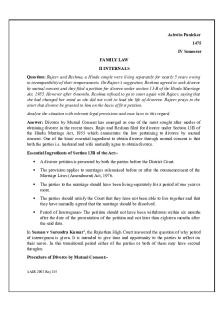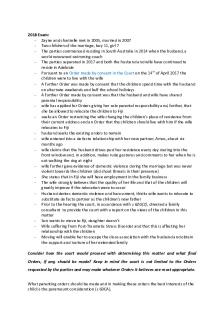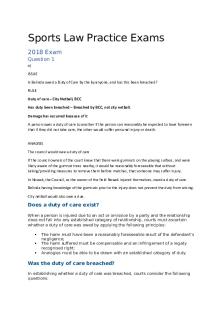Family Law II Internal Exams PDF

| Title | Family Law II Internal Exams |
|---|---|
| Course | Family Law |
| Institution | National University of Advanced Legal Studies |
| Pages | 3 |
| File Size | 128.7 KB |
| File Type | |
| Total Downloads | 94 |
| Total Views | 141 |
Summary
Download Family Law II Internal Exams PDF
Description
Ashwin Panicker 1475 IV Semester FAMILY LAW III INTERNALS Question: Analyse the statements provided below and identify the category of the dissolution of marriage according to in the Muslim law. Explain the same. a) A Muslim woman dissolves marriage on the ground that her husband has alleged her to be in an adulterous relationship. b) A Muslim woman dissolves the marriage on payment of Rs.50, 000 to the husband as consideration. c) A Muslim husband says to his wife ‘I swear by God that I shall not approach you’. d) A Muslim woman dissolves the marriage on the ground that her husband has disrespected her by comparing with his foster mother. e) A Muslim woman dissolves her marriage whose marriage was solemnized before attaining the age of 15 years. Answer: a). A Muslim woman dissolves marriage on the ground that her husband has alleged her to be in an adulterous relationship. It was held in the case of Nurjahan v. Kazim Ali1 by the Calcutta High Court that if the husband levels false charges of unchastity or adultery against his wife then this amounts to character assassination and the wife has got the right to ask for divorce on these grounds. Such a mode of divorce is called Lian. However, it is only a voluntary and aggressive charge of adultery made by the husband which, if false, would entitle the wife to get the wife to get the decree of divorce on the ground of Lian. However, interestingly where a wife hurts the feelings of her husband with her behaviour and the husband hits back an allegation of infidelity against her , then what the husband says in response to the bad behaviour of the wife, cannot be used by the wife as a false charge of adultery and no divorce is to be granted under Lian. b). A Muslim woman dissolves the marriage on payment of Rs.50, 000 to the husband as consideration. This type of dissolution at the instance of wife is called Khula. The word khula, in its original sense means "to draw" or "dig up" or "to take off" such as taking off one's clothes or garments. It is said that the spouses are like clothes to each other and when they take khula each takes off his or her clothes i.e., they get rid of each other. 1 AIR 1977 Cal 90=
In law it is said is said to signify an agreement between the spouses for dissolving a connubial union in lieu of compensation paid by the wife to her husband out of her property. Although consideration for Khula is essential, the actual release of the dower or delivery of property constituting the consideration is not a condition precedent for the validity of the khula. Once the husband gives his consent, it results in an irrevocable divorce. The husband has no power of cancelling the 'khul' on the ground that the consideration has not been paid. The consideration can be anything, usually it is mahr, the whole or part of it. But it may be any property though not illusory. c). A Muslim husband says to his wife ‘I swear by God that I shall not approach you’. This type of dissolution is called Ila. In Ila, the husband takes an oath not to have sexual intercourse with his wife. Followed by this oath, there is no consummation for a period of four months. After the expiry of the fourth month, the marriage dissolves irrevocably. But if the husband resumes cohabitation within four months, Ila is cancelled and the marriage does not dissolve. Under Ithna Asharia (Shia) School, Ila, does not operate as divorce without order of the court of law. After the expiry of the fourth month, the wife is simply entitled for a judicial divorce. If there is no cohabitation, even after expiry of four months, the wife may file a suit for restitution of conjugal rights against the husband. In Bibi Rehana Khatoon v s Iqtedar-JJddin Hussain 2, it was held that a declaration by the husband that his wife would be a wife in name only was not to amount to an Ila vow. This can be based on due fact that here the husband had merely made a statement and had not taken a vow and does not undertake any penalty on being guilty of its breach. d). A Muslim woman dissolves the marriage on the ground that her husband has disrespected her by comparing with his foster mother. This type of dissolution initiated by wife is called Zihar. In this mode the husband compares his wife with a woman within his prohibited relationship e.g., mother or sister etc. The husband would say that from today the wife is like his mother or sister. After such a comparison the husband does not cohabit with his wife for a period of four months. Upon the expiry of the said period Zihar is complete. Wife can refuse sexual cohabitation until the husband performs expiation by penance. In default of penance she can claim divorce. e). A Muslim woman dissolves her marriage whose marriage was solemnized before attaining the age of 15 years. A woman married under Muslim law shall be entitled to obtain a decree for the dissolution of her marriage on various grounds for decree for dissolution of marriage. In The Dissolution of Muslim Marriage Act 1939, (vi) ground states that she, having been given in marriage by her father or other guardian before she attained the age of fifteen years, repudiated the marriage before attaining the age of eighteen years: Provided that the marriage has not 2AIR. 1943, All. 84.
been consummated. In 2017, Supreme Court had highlighted how this particular provision of The Dissolution of Muslim Marriages Act makes a mockery of the Prohibition of Child Marriage Act....
Similar Free PDFs

Family Law II Internal Exams
- 3 Pages

Family Law Internal Exams
- 4 Pages

Family Law past exams answers
- 22 Pages

FAMILY LAW LAW DEGRE
- 9 Pages

Family law
- 2 Pages

Taxation Law Deferred exams
- 7 Pages

Internal Law Vs External Law
- 10 Pages

Company LAW Exams Answers
- 6 Pages

Sports Law Practice Exams
- 2 Pages

Family LAW Outline
- 52 Pages

Family Law Outline
- 44 Pages

Family Law Syllabus Final
- 6 Pages

S8 orders family law
- 15 Pages

Family LAW - I notes
- 12 Pages

Family Law Outline - Garcia
- 49 Pages

MCQ - Family Law I
- 20 Pages
Popular Institutions
- Tinajero National High School - Annex
- Politeknik Caltex Riau
- Yokohama City University
- SGT University
- University of Al-Qadisiyah
- Divine Word College of Vigan
- Techniek College Rotterdam
- Universidade de Santiago
- Universiti Teknologi MARA Cawangan Johor Kampus Pasir Gudang
- Poltekkes Kemenkes Yogyakarta
- Baguio City National High School
- Colegio san marcos
- preparatoria uno
- Centro de Bachillerato Tecnológico Industrial y de Servicios No. 107
- Dalian Maritime University
- Quang Trung Secondary School
- Colegio Tecnológico en Informática
- Corporación Regional de Educación Superior
- Grupo CEDVA
- Dar Al Uloom University
- Centro de Estudios Preuniversitarios de la Universidad Nacional de Ingeniería
- 上智大学
- Aakash International School, Nuna Majara
- San Felipe Neri Catholic School
- Kang Chiao International School - New Taipei City
- Misamis Occidental National High School
- Institución Educativa Escuela Normal Juan Ladrilleros
- Kolehiyo ng Pantukan
- Batanes State College
- Instituto Continental
- Sekolah Menengah Kejuruan Kesehatan Kaltara (Tarakan)
- Colegio de La Inmaculada Concepcion - Cebu